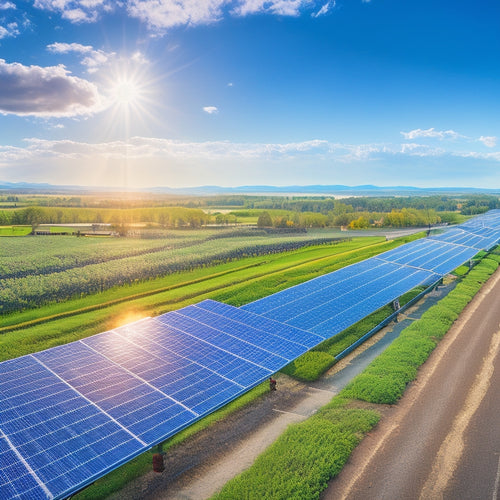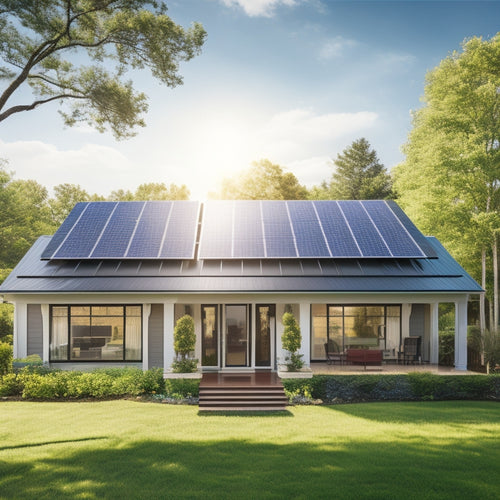
Off Grid Solar System With Battery Backup
Share
You've invested in an off-grid solar system, and now you're looking to enhance it with a dependable battery backup to guarantee uninterrupted power supply during grid outages. A well-designed off-grid solar system with battery backup provides reliable power during blackouts, supports essential appliances, and achieves grid independence. Deep cycle batteries, like Flooded Lead Acid and Sealed Maintenance Free, are vital for energy storage. Evaluating your energy demands accurately and maintaining your batteries properly are fundamental for maximum performance. By understanding the complexities of off-grid solar systems, you'll be well on your way to achieving energy autonomy and reducing your reliance on utility companies - and there's more to investigate on this path to independence.
The Essentials
- Off-grid solar systems with battery backup provide reliable power during outages, ensuring grid independence and peace of mind.
- Battery backup systems prevent food spoilage and protect electronics during outages, supporting critical appliances like medical equipment and security systems.
- Off-grid solar systems significantly reduce energy costs by generating renewable power, with potential savings of up to 90% on energy bills.
- Deep cycle batteries, such as flooded lead acid and sealed maintenance-free options, are essential for energy storage in off-grid systems, with benefits like low maintenance and safety.
- Accurate assessment of energy demands, including daily usage patterns and total power requirements, is crucial for optimizing off-grid solar system efficiency and sizing.
Reliable Power During Outages
When the grid goes down, you'll still have power during blackouts with an off-grid solar system.
This means you can maintain grid independence now, without relying on the utility company to get your lights back on.
Power During Blackouts
During extended power outages, having a dependable source of electricity can be a groundbreaking solution. It's crucial to prepare for the unexpected, and an off-grid solar system with battery backup guarantees you're never left in the dark.
With a well-designed system, you can enjoy uninterrupted power during blackouts, keeping your critical appliances running and your family comfortable. Furthermore, a reliable battery backup system prevents costly losses due to food spoilage and damage to electronics Power Outage Protection, making it a vital investment for any household.
You'll appreciate the peace of mind that comes with blackout preparedness. By investing in a high-quality backup power solution, you'll be shielded from the unpredictability of the grid. This means you can keep your refrigerator running, lights on, and communication devices charged, even when the grid fails.
Your off-grid solar system will seamlessly shift to battery power during an outage, providing a reliable source of electricity. With a properly sized system, you can power essential loads, such as medical equipment, water pumps, and security systems.
Grid Independence Now
By achieving grid independence, you'll experience the comfort and security of reliable power during outages, allowing you to live life uninterrupted.
No longer will you be at the mercy of the grid, wondering when the lights will come back on. With an off-grid solar system and battery backup, you'll have the energy independence you need to thrive, even when the grid fails.
This is especially vital when considering the limitations of traditional energy storage systems, which can lead to inconsistent power supply and premature battery degradation.
Grid autonomy is within your reach, and it's more than just a convenience – it's a necessity.
Imagine having the power to keep your lights on, your refrigerator running, and your communication devices charged, all while the grid is down.
You'll be able to work, study, and live without interruption, while others are left in the dark.
Renewable Energy Savings Guaranteed
You'll see a significant reduction in your energy costs with an off-grid solar system, as you generate your own renewable power and reduce your reliance on the grid.
By installing photovoltaic cells on your roof, you can maximize your energy efficiency and capture the full potential of solar power.
Additionally, you may be eligible for renewable power incentives, such as tax credits or rebates, which can help offset the initial cost of your system.
Energy Cost Reduction
One of the most notable benefits of an off-grid solar system is the considerable reduction in energy costs. By utilizing the power of the sun, you can greatly lower your reliance on traditional energy sources, resulting in substantial savings on your energy bills.
| Energy Cost Reduction Benefits | Description |
|---|---|
| Reduced Energy Bills | Lower your energy costs by up to 90% with an off-grid solar system |
| Increased Energy Efficiency | Maximize your energy efficiency with a solar investment that pays for itself |
| Reduced Carbon Footprint | Contribute to a cleaner environment by reducing your reliance on fossil fuels |
| Long-Term Savings | Enjoy long-term energy cost savings with a solar system that lasts for decades |
With an off-grid solar system, you can enjoy considerable energy cost reductions, making it an attractive option for those looking to break free from the grid. By investing in solar energy, you're not only reducing your energy bills but also contributing to a more sustainable future.
Renewable Power Incentives
As you shift to an off-grid solar system, you're not only reducing your energy costs but also becoming eligible for renewable power incentives that guarantee considerable savings.
These incentives are designed to encourage individuals and businesses to invest in renewable energy sources, like solar power. You can benefit from various incentive programs, such as tax credits, rebate options, and funding opportunities, which can considerably reduce the upfront cost of your off-grid solar system.
Government subsidies and solar grants are also available to support your shift to renewable energy.
Additionally, many states and utilities offer financial incentives, such as net metering and renewable energy certificates, to promote energy efficiency and solar investments.
By taking advantage of these renewable initiatives, you can maximize your savings and accelerate your return on investment.
With these incentives, you can enjoy the freedom and independence that comes with generating your own clean energy while reducing your reliance on the grid.
Deep Cycle Battery Types
You'll need to choose the right type of deep cycle battery for your off-grid solar system, and you have two primary options: Flooded Lead Acid and Sealed Maintenance Free.
When it comes to energy storage, home energy storage solutions like LG Chem, Tesla Powerwall, and Sonnen eco are popular choices, but for off-grid systems, deep cycle batteries are a more suitable option.
Flooded Lead Acid batteries require regular maintenance, including checking and adding electrolyte, whereas Sealed Maintenance Free batteries are closed systems that don't allow for electrolyte level checks.
Both types have their pros and cons, and understanding their differences is essential for selecting the best fit for your system.
Flooded Lead Acid
Across the range of deep cycle battery types, flooded lead acid batteries stand out for their reliability, affordability, and widespread adoption in off-grid solar systems. You'll find them in many renewable energy systems due to their low upfront cost and well-established manufacturing infrastructure.
| Characteristic | Description |
|---|---|
| Advantages | High surge capacity, low cost, and well-established manufacturing infrastructure |
| Disadvantages | Requires regular maintenance, emits hydrogen gas, and has a shorter lifespan compared to other deep cycle battery types |
| Maintenance | Regular watering, equalization charging, and monitoring of electrolyte levels |
| Lifespan | 5-7 years with proper maintenance, and up to 10 years in ideal conditions |
When choosing flooded lead acid batteries, you should consider their applications in off-grid solar systems, backup power systems, and renewable energy systems. While they have a lower upfront cost, their maintenance requirements and shorter lifespan may impact their overall value. Additionally, flooded lead acid batteries require proper safety precautions due to the risk of acid spills and hydrogen gas emission.
Sealed Maintenance Free
Sealed maintenance-free deep cycle batteries offer a convenient alternative to flooded lead acid batteries, eliminating the need for regular maintenance and minimizing the risk of acid spills and hydrogen gas emission.
You'll appreciate the benefits of sealed technology advancements, which guarantee a safer and more reliable operation.
With sealed maintenance-free batteries, you won't need to worry about checking and topping off electrolyte levels or equalizing charges. This simplifies your maintenance strategies, allowing you to focus on enjoying your off-grid lifestyle.
These batteries are designed to be leak-proof, with a sealed construction that prevents acid spills and minimizes the risk of hydrogen gas emission.
As you consider your off-grid solar system, sealed maintenance-free batteries provide a reliable and low-maintenance solution for storing excess energy.
You'll have peace of mind knowing your batteries are designed to withstand the demands of deep cycling, providing a consistent and reliable power source when you need it most.
Assess Your Energy Demands
You need to determine your daily energy usage patterns to identify the times of day when you require the most power. This involves tracking your energy consumption over a typical day, week, or month to understand your peak usage periods.
To maximize energy savings and reduce reliance on the grid, it's crucial to evaluate renewable energy solutions that can provide 24/7 backup power for your home. Your total power requirements will depend on the combined energy needs of all your appliances, devices, and systems, which you'll need to calculate to size your off-grid solar system accurately.
Daily Energy Usage Patterns
Efficiency begins with understanding your daily energy habits. To accurately assess your energy demands, you need to analyze your energy consumption patterns. This involves tracking your energy usage throughout the day to identify peak hours, low-usage periods, and the types of appliances that consume the most energy.
| Time of Day | Energy Consumption |
|---|---|
| Morning (6am-10am) | High (lights, coffee maker, refrigerator) |
| Afternoon (10am-4pm) | Medium (computer, TV, fans) |
| Evening (4pm-10pm) | High (lights, oven, air conditioner) |
Total Power Requirements Needed
Analyzing your daily energy consumption patterns provides significant observations into your energy demands.
You've already identified your daily energy usage patterns, now it's time to calculate your total power requirements needed. This involves summing up the total watt-hours (Wh) required to power your appliances and devices.
To do this, multiply the total wattage of each appliance by the number of hours it's used daily. For instance, if you have a 100W refrigerator running for 8 hours, that's 800Wh.
Add up the Wh for all your appliances to get your total daily energy consumption. This will give you your total power requirements needed.
Achieving energy efficiency is essential in off-grid living. Understanding your consumption habits helps you identify areas for improvement.
By optimizing your energy usage, you can reduce your reliance on the grid and enjoy greater freedom. Be honest about your energy needs, and don't underestimate them.
A accurate assessment guarantees you design an off-grid solar system that meets your needs, providing you with the independence you desire.
Longer Battery Lifespan Guaranteed
You'll want to prioritize proper maintenance schedules to guarantee your off-grid solar system's batteries last as long as possible.
By doing so, you'll prevent premature wear, reduce the risk of battery failure, and maximize your system's overall efficiency.
Regular checks and upkeep will help you identify and address potential issues before they become major problems.
Proper Maintenance Schedules
Reliability is the backbone of any off-grid solar system, and a well-planned maintenance schedule is essential to ensuring that your batteries perform at their best and last longer.
You'll want to create a routine that includes regular battery cleaning, which involves inspecting and cleaning the terminals and connections to prevent corrosion. This simple task can greatly extend the life of your batteries.
In addition to cleaning, you'll need to monitor the charge levels of your batteries. Charge monitoring involves tracking the state of charge (SOC) and state of health (SOH) of your batteries to identify any potential issues before they become major problems.
This can be done using a battery monitoring system or a smart charger with built-in monitoring capabilities.
Frequently Asked Questions
Can I Add More Solar Panels to My Existing System Later?
You can add more solar panels to your existing system later, but verify compatibility by checking the panel's voltage, current, and connector type, and investigate system expansion options to maximize energy output and storage capacity.
How Long Does It Take to Install an Off-Grid Solar System?
Did you know that 1 in 5 solar installations take less than 3 days to complete? You'll likely spend around 2-5 days installing your system, depending on the installation timeline and overcoming challenges like permitting and electrical connections.
Are Off-Grid Solar Systems Suitable for Small Homes or Apartments?
You're seeking energy independence in small spaces, and you're wondering if off-grid solar systems can deliver. The answer lies in system sizing: with careful planning, you can capture enough power for small homes or apartments, ensuring freedom from the grid.
Can I Use My Existing Electrical Panel With a New System?
You'll need to assess your existing panel's compatibility with the new system; if it's outdated, you may require an upgrade, but if it's relatively modern, you can likely reuse it, saving on costs and streamlining the installation process.
Are There Any Maintenance Requirements for the Battery Backup?
You'll need to prioritize a maintenance schedule to guarantee battery longevity, checking electrolyte levels, cleaning terminals, and monitoring state-of-charge; neglecting these tasks can reduce your battery's lifespan, compromising your off-grid independence.
Final Thoughts
As you weigh the pros and cons of going off-grid, remember that reliability trumps uncertainty. With an off-grid solar system and battery backup, you'll have power when the grid fails, and savings when the sun shines. Gone are the days of flickering candles and food spoilage. Instead, enjoy the peace of mind that comes with a system customized to your energy needs, backed by long-lasting deep cycle batteries. The darkness of uncertainty is illuminated by the bright light of renewable energy.
Related Posts
-

Net Metering in Renewable Energy's Future
Net metering's future is vital for driving renewable energy growth and financial savings. You can reduce your electri...
-

Applications of Photovoltaic Systems
Photovoltaic systems are versatile, converting sunlight into electricity for various applications. You can use them i...
-

Home Solar Installation Cost
You're considering installing solar panels on your home, and the upfront cost is likely the biggest hurdle standing i...


